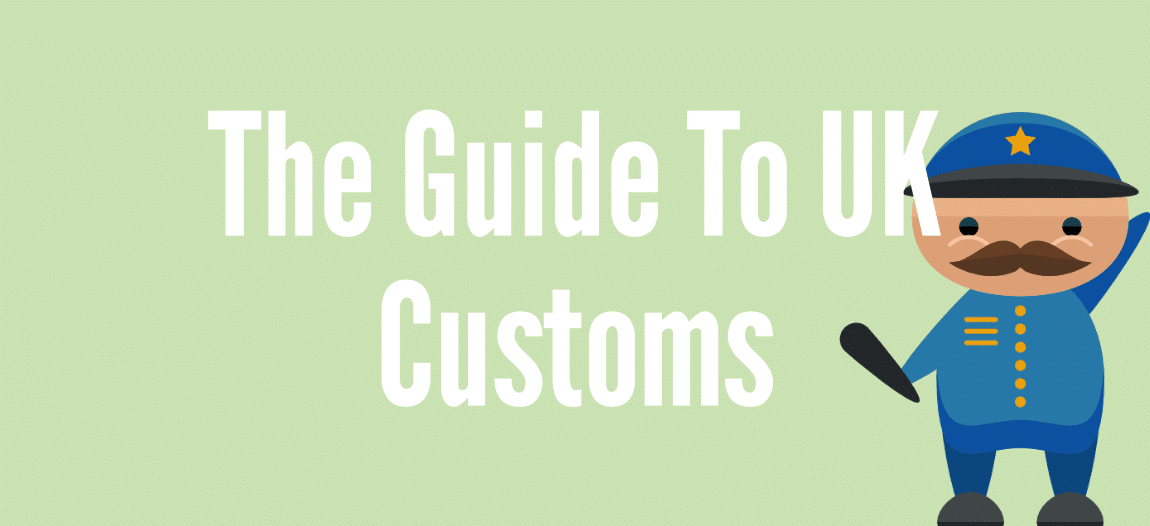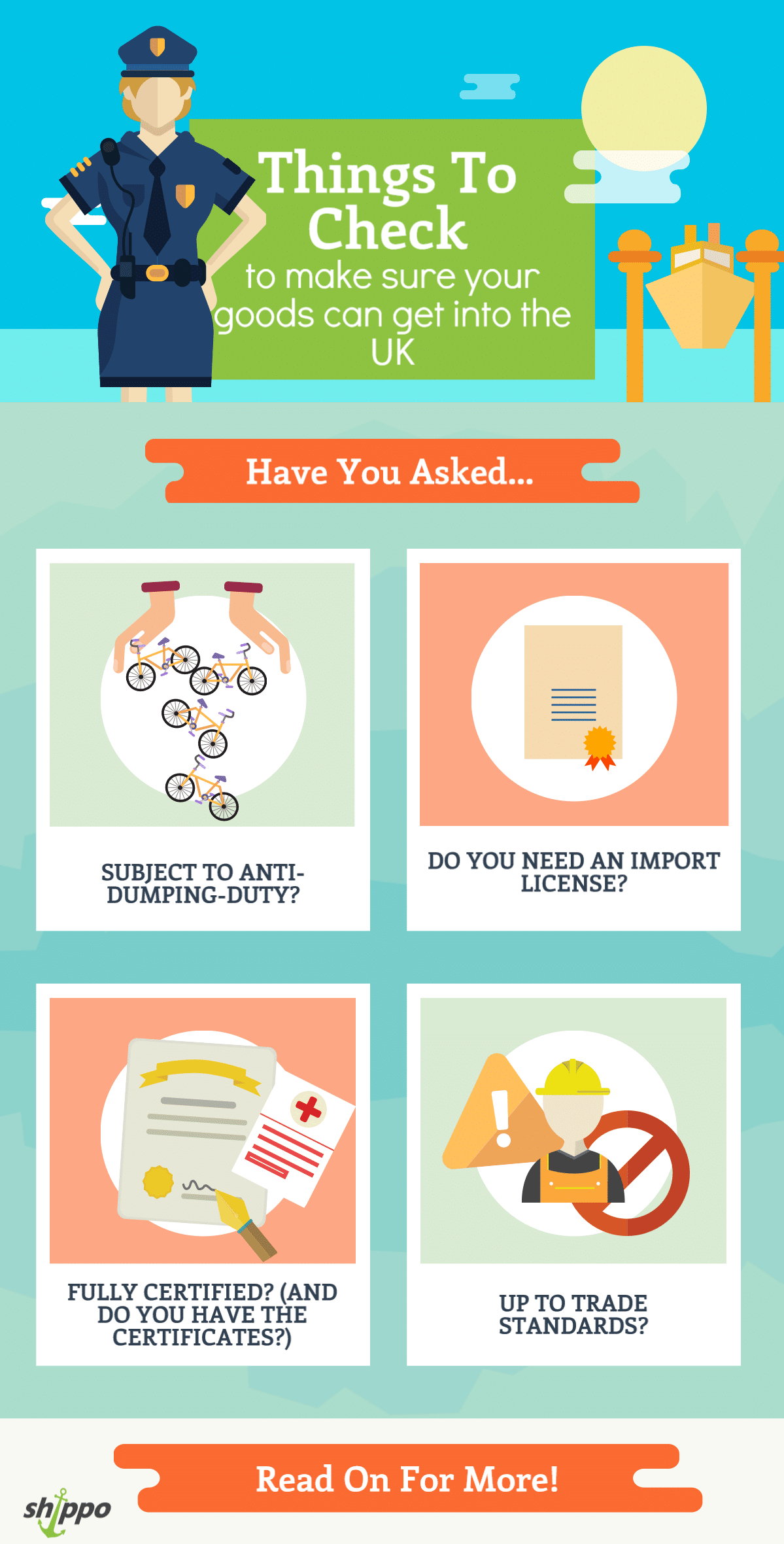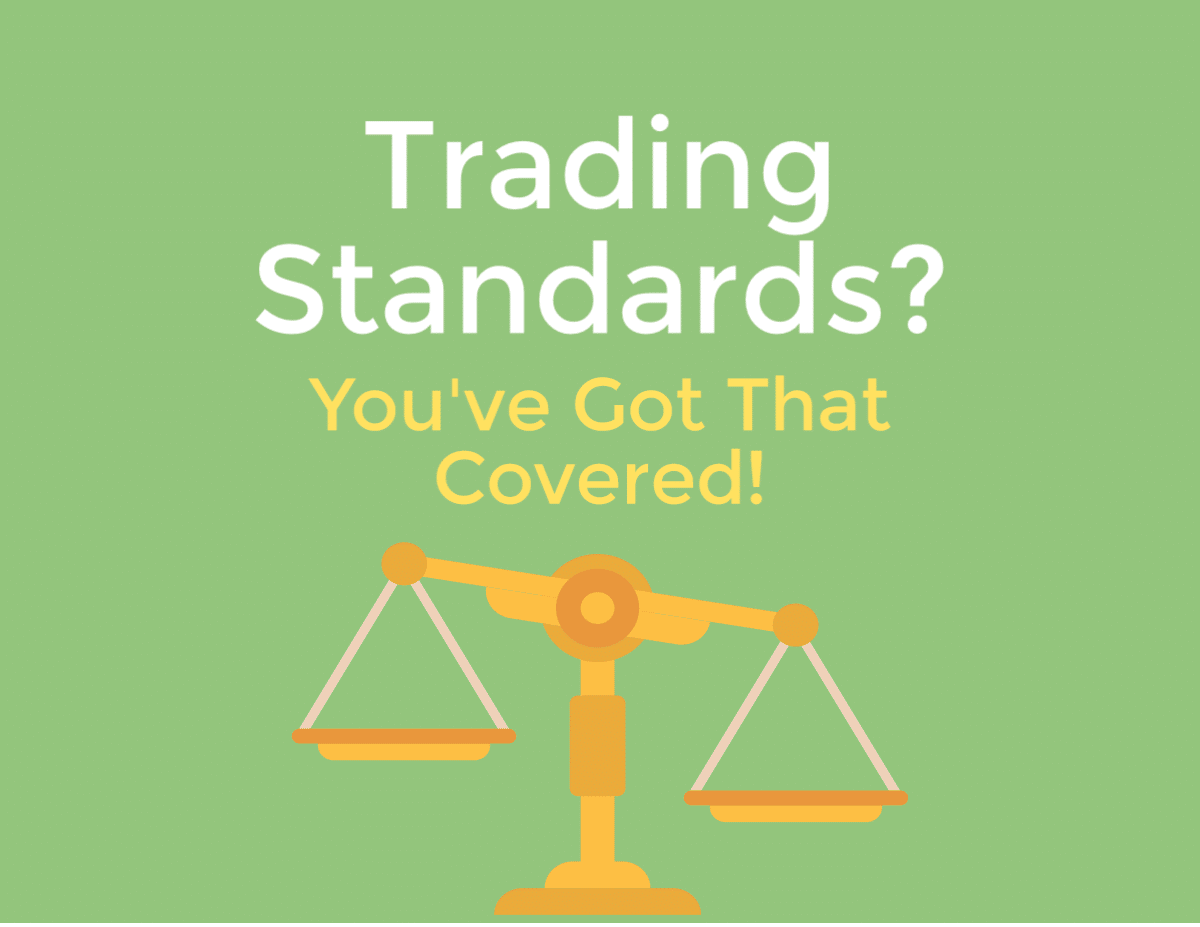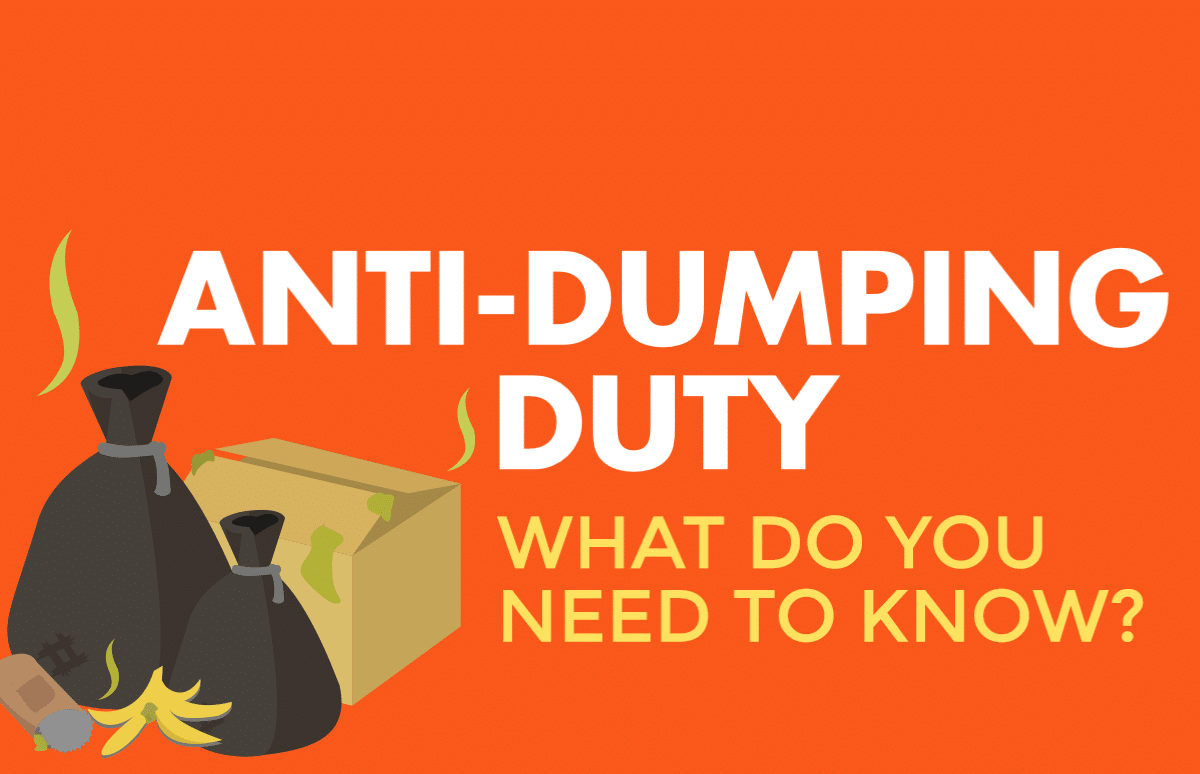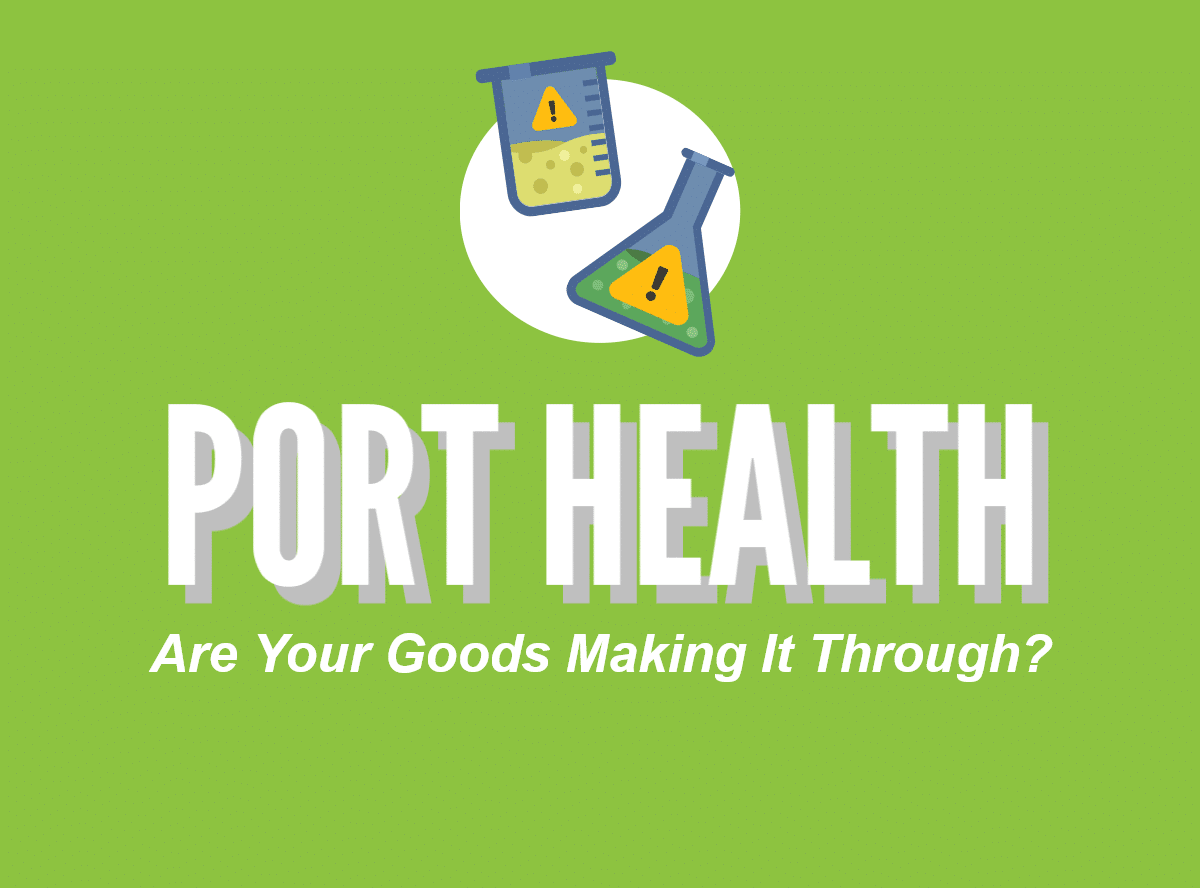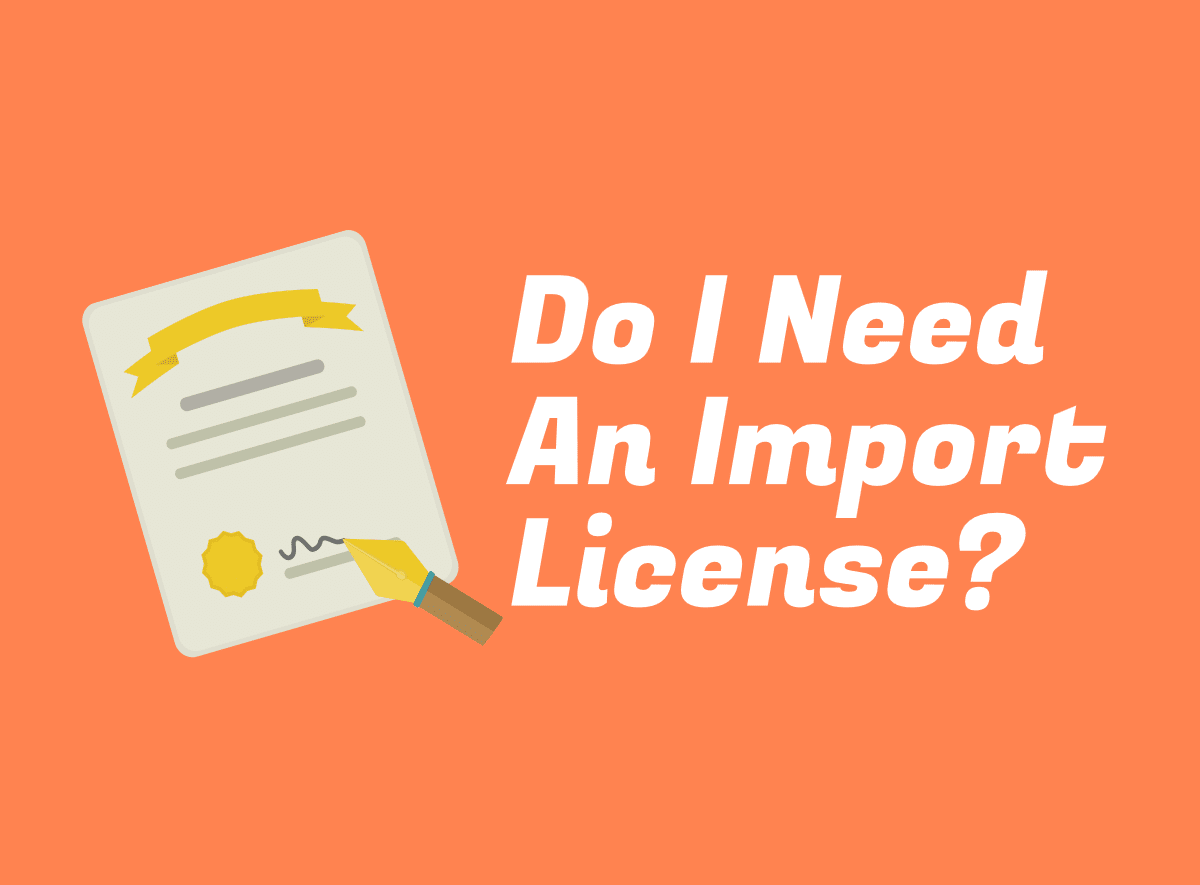This content was reviewed for accuracy on 27/06/2025
UK customs clearance is an essential step in the importing process; if your goods can’t clear customs, they can’t enter the UK. No ifs and no buts – customs control the border; if your goods don’t clear them, your goods don’t get into the country.
Something we see on occasion is the rejection of imported goods. Importers ship their products to the UK, only for Trading Standards or Port Health Officers to tell them they’re not fit for the UK market. Sometimes goods can be hit with anti-dumping duties of up to 90%! This is nearly always because the buyer hasn’t done their homework.
Naturally, this can be stressful for buyers. If the goods can’t get in, the importer has to pay to get the goods back to their country of origin or, worse, have them officially destroyed. There is also no guarantee the supplier will refund them – and they’ve just lost a lot of time and money.
Things To Check For UK Customs Clearance (Infographic)
Today, we’re teaching you how to avoid these outcomes when clearing goods through UK Customs. Take a look at our handy infographic below for a checklist to give you the best possible chance of having your goods cleared by customs.
-
FAQs About UK Customs Goods Clearance
What Are UK Customs?
UK Customs is a border control unit that monitors and controls what is allowed to leave the country; Customs are also the ones that charge UK Duties and Taxes. Customs is a protective measure, put in place to ensure that nothing harmful to the UK can enter.
How Long Does Customs Clearance Usually Take?
Customs clearance normally takes a matter of minutes or hours but it can take days or even weeks if there’s something wrong or your goods need to be inspected. We generally say that from your goods landing in the UK you’ll have them delivered to your door in about 7 days and the customs clearance is only a fraction of that time.
Why Do Goods Get Held By Customs? & What To Do If Your Goods Are Being Held
There are many reasons that your goods can be held at customs. Most of these reasons are due to the fact that customs can’t (from their perspective) safely clear your goods. If you haven’t provided the necessary certification (such as safety or test certificates) or you don’t have your documents ready (an EORI number, for example), this will cause customs to hold your goods until you can provide these documents.
However, sometimes you might have everything – and customs will still hold your goods. A reason that this often happens is that they want to test your goods for quality or compliance with UK standards. Although this is inconvenient, unfortunately, there’s nothing you can do about random selection.
If your goods are being held, the best thing to do is call your freight forwarder and find out if they need any additional information or certification that you may be able to acquire from your supplier. If you’ve provided all the information that you can, it’s usually better to leave Customs to their job – push them too hard and you’ll find your goods stuck at the end of the queue!
Do I Need To Pay Customs?
Yes. Whenever you import over £15 worth of goods – whether that’s for personal or commercial use – you will need to pay customs tax.
When & How Do I Pay Customs?
If you’re importing, you’ll usually have a freight forwarder to pay Customs on your behalf, so you probably won’t even have to pay Customs yourself. However, if you do ever need to, you are usually sent a letter containing an invoice detailing all your various charges once your goods reach the UK. It’s like the world’s worst Christmas card. You’ll need to pay your Customs charges before they release their goods to you.
Oh – and the longer you take to pay the charges, the more storage fees you accrue. So it’s really best to get that done quickly.
Can I Claim Customs Duties Back?
Finally – a bit of good news!
You can’t claim UK Duties however, if you’re a VAT-registered business, you can claim VAT back on all of your imports. As VAT is 20% of your entire process cost (freight, customs duties and product cost all included) this is a large saving.
Read more about being a VAT registered business and whether it’s beneficial for your business here.
However, you can now help your business’ cash-flow by deferring your VAT through the government ‘Postponed VAT Accounting’ scheme where you pay and reclaim the VAT in the same VAT return therefore, this cancels out the figure… meaning there is no VAT to pay on your import.
How To Avoid Customs Charges
Now, here’s the real juicy secret that everyone wants to know – how do you get out of paying customs fees? Well, in some respects, you can’t; things like declaring your goods under lower commodity codes and faking how much they’re worth to lower your Duties and Taxes are illegal and no reputable company will help you with that.
However, there are legal ways to wiggle out of paying those charges – Duty Relief Schemes. Depending on a number of variables (including, but not limited to country of origin, type of product, intent for product’s use) you can be eligible for a Duty Relief Scheme that could mean you pay less and sometimes no duty to Customs.
Find out more information about Duty Relief Schemes.
How Are Customs Charges Calculated?
There are three things that Customs calculate charges on:
- UK Duty – UK Duty is charged as a percentage of your product’s value, depending on what your product’s commodity code has its duty rating at.
- UK VAT – VAT is 20% of all charges incurred during the importing process
- Any additionally incurred costs (X-Rays, testing, storage, etc.) – If your goods are unlucky enough to get held by customs, they will also charge you for any testing that they do. On top of this, you’ll need to pay storage if your goods are left there longer than the allotted free time period.
If you want to predict your UK Duty, we’d recommend reading: How To Find Your Product’s Commodity Code On The UK Trade Tariff and then using our free UK Duty Calculator.
If you want to know more about UK Duties and Taxes in depth, read this.
Customs Delays
We’ve already written a blog post about delays in shipping and how to avoid them – but delays in Customs are due to your goods being held up for testing or additional documentation needing to be provided.
What Happens In Terms Of Customs When I Dropship?
If you’re drop-shipping from outside the UK straight to your customer, depending on the value of your goods, the customs charges will be directed to your customer.
CIF Shipping Terms and Customs
When you’re shipping on CIF shipping terms, you may have problems finding people to clear and deliver your goods for you. This is because, when shipping on CIF shipping terms, all of the hidden extra fees are added to the customs bill – so the unlucky forwarder that clears and delivers your goods for you looks responsible for the charges.
CIF shipping terms (your supplier getting your goods to a port near you) are rife with inefficient money management; initially, it looks like an amazing deal because the shipping cost appears so cheap – but all of those “savings” end up added to your customs bill at the end.
Learn about the risks of CIF/CFR Shipping
UK Customs and Excise Goods
Now, here’s where it gets a bit tricky; everything you know about Customs flies out of the window when it comes to excise goods. Excise is an inland tax, so you probably won’t have to pay UK Duty on excise products at Customs.
-
What Do I Need to Clear Goods Through UK Customs?
Here’s a post explaining all the documentation that you need to clear goods through UK Customs. We’re going to talk in more detail about everything you need to clear customs below too. Strap in and grab a coffee because there is a lot of information here!
Trading Standards
What Are Trading Standards?
Trading Standards are a government service dedicated to protecting and supporting consumers and small businesses; it is their job to ensure that goods entering our market are of a certain quality and that they are being distributed in a certain way. When clearing customs, Trading Standards are generally the body that will raise flags on your goods if they’re unfit. They are a local service, which means each area has their own Trading Standards unit. Trading Standards have a wide range of responsibilities that include, but are not limited to:
- Consumer Safety
- Counterfeit Goods
- Product Labelling
- Weights and Measures
- Under-Age Sales
- Animal Welfare
Their duties include:
- Visiting local traders for routine checks or to investigate complaints
- Taking samples of goods for testing
- Checking that weighing scales and measures are accurate
- Checking that food labelling is correct and advertising is not misleading
- Advising consumers and businesses about the law
- Investigating suspected offences, which could include undercover or surveillance work
- Preparing evidence and prosecuting cases in court
- Writing reports and keeping records
For the purpose of this post, we’re only focusing on the aspects of Trading Standards that affect importing.
Needless to say, the Trading Standards are there for a reason. They are essential to safety and quality control. If an importer were to bring in a flux of faulty phone chargers and the goods went unchecked, there could be electrical fires breaking out all over the country. Customs are in place to avoid this. So it’s not a case of working against the Trading Standards or trying to cheat them; it’s a case of making sure your product lives up to them.
Shippo; How long does custom clearance take uk?, trends
What Goods Are Subject To Trading Standards?All goods are subject to Trading Standards; however, there are certain items they pay more attention to and subsequently, you will need to be more careful whilst importing. These are a few of the items that trading standards are most likely to detain.
- Lithium batteries. As lithium batteries can sometimes be unstable, (they are listed under Dangerous Goods) Trading Standards pay close attention to the importation of them. If you are importing lithium batteries, you may want to check this out: The Full Guide To Importing Lithium Batteries.
- Hover-boards. (AKA: Segways) One of the most popular news stories for importing in recent years is the importation of hover-boards – last Christmas, over 17,000 hover-boards attempted to be imported and, of those, 15,000 were detained for being unsafe. (Source: TradingStandards.uk)
- Toys. Naturally, anything that goes near children is going to need to be regulated – toys are not the exception. There are a surprising amount of regulations for toys, so if you’re importing these make sure you’re aware.
- Electronics. There is so much potential for danger in electronics; fires, electrocution, dodgy wiring . . . If you are importing electrical goods, you will need to be on top of your documentation.
Why Are My Goods Scrutinised By Trading Standards?
Although the reasons for goods being detained is on a case-by-case basis, there are a few common reasons that your goods may be monitored by Trading Standards and what they may be looking for.
- Intellectual Property Issues. We’ve written an entire section on intellectual property issues, so either click here or scroll down to learn more.
- Missing markings – “It was also missing the electrical ratings and WEEE logo. The product was considered high risk due to the potential electric shock hazard and the required markings were missing from the instructions, product and the packaging.“
- Adapters and plugs. Anything electrical is always going to attract attention because of the safety risk that poor manufacturing poses, but plugs and adapters are often the source of scrutiny. – “Examinations revealed 140 electric kettles and 12 rice cookers with 2-pin plugs and 240 travel adaptors. All items sampled were deemed unsafe due to inaccurate wiring, no fuses and no earth as well as non-compliance on the 3-pin spacing.“
How Can I Make Sure My Products Meet Trading Standards?
Long story short, to ensure that your products clearly meet trading standards, you have to make sure that they are of a certain quality. You have to make sure that your manufacturer has made them to be safe and usable. Proving this is usually a case of making sure you have the necessary documentation. This can differ for each individual product category, so make sure to look it up. However, we’ve included a few examples.
- All toys have to carry a CE marking; this shows that manufacturers have adhered to European trade standards. Customs requires this to clear certain products.
Note!
This isn’t the manufacturer’s duty. As the buyer, if you want your toy (or any product) marked to compliance with a certain law or certification especially one regional to your country or a European standard (like the CE marking) it is up to you to provide the manufacturer with the necessary documentation. Some other products also require the CE marking.Save
- The product category of electronics is the real danger; if you’re importing any kind of electronics, make sure you’re absolutely on top of your documentation. When sourcing your products, ask your manufacturer how thoroughly the goods have been tested – and make sure you get the proof too! Your suppliers can test your goods in the country of origin and provide documents proving that the goods are of a certain standard.
There are a few additional things you can do before importing your product, however:
- Know the material your product is made of. Sometimes the material of the product itself may be what causes the issue. – “There was one item found, bath ducks, which appeared to be made of a similar type of vinyl to the dolls previously found to be non-compliant as they contained prohibited Phthalates. These were sampled and failed as they contained 329 times the permitted legal level for this toxin group. They were subsequently destroyed.“
In the words of the National Trading Standards UK,
“Many traders rely on the certificates issued in China to demonstrate compliance but do not check either the validity or the authenticity of the documents. In addition, they believe that compliance with a standard is sufficient to meet the essential safety requirements of relevant Directives which is not necessarily the case. There is a need for some businesses to better understand that supplying a safe product is about meeting the safety requirements of legislation and not just having a product that has been assessed as compliant with a standard.” * – All quotes sourced from National Trading Standards UK Annual Report.
Save
Save
Save
Save
Save
Save
Save
Save
Save
Save
Save
Save
Save
Save
Save
Save
Save
Save
Save
Save
Save
Save
Save
Save
Save
Save
Save
Save
Save
Save
Save
-
Anti-Dumping Duty
What Is Anti Dumping Duty?
Anti-Dumping Duty is the duty imposed on importers to prevent them from ruining their domestic economy. This is done when suppliers sell goods for less than their native market rate to importers who then sell them for a low amount in their own country. These duties are also imposed when the EU wants to boost their own manufacture of a product, such as bicycles or ceramics. With this kind of product an Anti-Dumping Duty is added at the UK border and is charged as a percentage of the cost of the goods. This is dependent on the situation and can vary depending on the product and where it is being purchased from. Certain items only incur a charge when they’re being sourced from a specific place – bikes incur an anti-dumping duty rate if they are purchased from China but not from some other parts of Asia.
What Does Anti-Dumping Duty Apply For & What Is The Cost?
- Bicycles and Parts (up to 48.5% when manufactured in China)
- e-Bikes (up to 83.6%)
- Ceramic Tableware and Kitchenware (up to 36.1%)
- Ironing Boards (up to 43%)
- Ceramic Tiles (up to 69.7%)
- . . . Your product???…you won’t know until you look! There isn’t an extensive list of what carries Anti-Dumping Duty and what doesn’t, but the UK Trade Tariff is where you can find out whether your product carries Anti-Dumping Duty or not and here’s a list of the recent additions.
As an example of the huge effects that anti-dumping duties have on the cost to buy products from outside the EU importing e-bikes from China now attracts them. As of 18th July 2018, all e-bike categories are subject to anti-dumping duties of 83.6% (unless the Chinese supplier has been allocated a reduced rate by the EU). When buying these types of goods you’ll be hit by anti-dumping duties of up to 83.6% in addition to the standard import duty rating of 6% (click on the “Import” tab to see how it looks on the trade tariff). The cost to buy and import these products has almost doubled as a result overnight which, the EU hope, will encourage importers to buy them from within the EU and boost the economies within it.
How Can I Avoid Anti-Dumping Duty?
Generally, you can’t. All you can do is make sure to know ahead of time whether you’re going to have to pay them and how much the payment will be. You may decide that you want to invest in a different product – but a lot of the time the profit margin is so large that an Anti-Dumping Duty fee won’t matter too much (Especially if it’s only 5%).
With some products that are liable to anti-dumping duties, there are occasions when it can be avoided. These include importing less than a certain number of products or using specific suppliers.
Save
Save
Save
Save
Save
Save
Save
Save
Save
Save
Save
Save
Save
Save
Save
Save
Save
-
Port Health
What Is Port Health?
Port Health are the authority whose job is to prevent diseases and infections from coming into Britain. This means that their focus generally leans towards food and food-related products (including plates/food containers and cutlery). They also ensure that the quality of imported food is of a certain standard and authenticate the origin of all goods coming in.
What Does Port Health Apply To?
Port Health checks:
- Food
- Things that touch food – this is actually one of the things that inspired this post. Recently, we’ve seen a massive influx of people importing plastic ‘Tupperware-type’ food containers; however, not all of them are making it into the UK. Why? Because Port Health is just as strict on things that touch food as well as just food. For the food containers, if the chemicals in the plastic can react with the food then they could be harmful.
There’s an increase of #ecommerce sellers #importing plastic lunch boxes; UK Port Health are very strict on the chemicals in plastic. Be careful!!
— Shippo (@Shippo_uk) 19 September 2016
- Medicines
- Supplements
How Can I Make Sure My Goods Clear Port Health?
Having your goods clear port health is essential if you want them in the UK.
- Organic certificate. If you’re importing organic goods, make sure you have your certificate ready (the stamped original from your supplier). If you don’t, you won’t be able to sell the goods as organic and may not even get them at all.
- Know your materials. We’ve already already touched on the Tupperware issue, but this is relevant for more than just plastic. Knowing what type of chemicals your material contains and whether they’re legal or not is important.
Save
Save
Save
Save
Save
Save
Save
Save
Save
Save
Save
Save
Save
Save
Save
Save
Save
Save
Save
Save
Save
Save
Save
Save
Save
Save
Save
Save
-
Import Licenses
What Are Import Licenses?
An import license is exactly what it sounds like – a license to import goods. There are limits to import licenses; they only allow you a certain amount of goods in a certain amount of time (usually a year). The purpose of import licenses is to control certain restricted goods; for example, things like firearms. Import licenses allow the government to make sure that not too much of a product is entering the UK. This also helps to protect the domestic market from being overtaken by imported goods.
Import licenses are not handed out by one body; there are separate government departments and businesses that may offer different licenses for different products. If you were to import medicine, you would need an import license from Medicines and Healthcare Products Regulatory Agency (MHRA), but if you were to import fur you would need a license from The Department for Environment, Food and Rural Affairs (Defra).
What Items Require An Import License?
While most items do not require an import license to import, some items do. These items are often dangerous or need heavier regulation.
- Drugs
- Certain Textiles
- Firearms and Ammunition
- Nuclear Materials
- Iron and Steel (from certain countries)
- Meat, Poultry, Milk and Other Foodstuffs
- Livestock
- Blood
- Plant/Plant products
- Endangered Species
- Fur
There are many other items that need an import license; however, most things are specialist so won’t affect the vast majority of importers.
Which Items Don’t Require An Import License
- Most items do not require an import license
- Items under £120 do not require an import license
According to www.gov.uk, goods that are of no statistical interest or not restricted can be exported without a declaration. Included in this are: - certain temporary exportation or re-exportation goods
- certain goods not subject to a commercial transaction
- accompanied personal or household goods
Save
Save
Save
Save
Save
Save
Save
Save
Save
Save
Save
Save
Save
Save
-
Intellectual Property
In importing, a lot of mistakes are made due to being misinformed; a lot of the time, importers can make genuine mistakes that result in their goods being destroyed and leave them thousands out of pocket. Unfortunately, a common mistake is the lack of adherence to intellectual property laws.
What Is Intellectual Property?
Intellectual property is the ownership of an intangible creative product; it is to literally own exclusive rights to your intellectual creations. This means that any ideas generated by you belong to you – and that nobody else has the right to use them, distribute them or profit off them without your permission. There are two branches of intellectual property:
- Industrial. Industrial property covers things like inventions (patents), trademarks, industrial designs and models. This means that if you were to, say, design a new phone another company couldn’t legally take your idea and produce it without your permission.
- Copyright. Copyright covers literary works (such as plays and novels), films, music, artwork (like paintings and sketches; photographs; sculptures) and architectural design. A popular example of this is Disney. All Disney characters belong to Disney; therefore, you cannot import anything with a character’s face on it unless you get exclusive permission from Disney themselves. Although it is possible to get permission to use Intellectual Property and some manufacturers may have paid the relevant licensing fee, a lot haven’t which makes their products illegal – and means that Customs will destroy them.
How Can I Avoid My Goods Being Detained For Intellectual Property Law Reasons?
Fortunately, Customs can be very understanding when it comes to IP laws and will often acknowledge that it is a genuine mistake (because, let’s be honest, you see Disney’s Frozen images everywhere on everything – you didn’t think it would be a big deal to sell lunchboxes with Elsa’s face on.) – by letting you off the hook and only destroying your items. You’ll still lose your money, but if it was an unknowing mistake you won’t be penalised any further.
“The children’s clothing was identified as counterfeit Disney character onesies, so a joint intervention with the International Trade team was undertaken. The toys were unsafe and the onesies non-compliant. No action has been taken against the woman, who acted in good faith but lost out financially by having her items detained and destroyed.” – National Trading Standards UK.However, intellectual property doesn’t just include images or logos; it also includes counterfeits and fakes.“The consignment contained 50 sets of unbranded hair straighteners. The products were found to be copies of GHD black and silver limited edition products, without any of the GHD registered trademarks applied. Officers suspected that the products were imported unbranded with the intention of branding at a later stage here in the UK, prior to sale. The products were found to pose a serious risk of electrocution and fire. The matter was referred to the inland authority for the importer in question.” – National Trading Standards UKTo avoid your goods being detained under IP law, make sure that:- You’ve asked your supplier to provide you with proof of licensing, so that (if you are importing goods that contain intellectual property) Customs know that it is legitimate.
- Your goods do not contain any brand names, logos, images, characters or anything else that could be classified as intellectual property.
- Your goods are unique, or at least not carbon copies of another branded product.
Save
Save
Save
Save
Save
Save
Save
Save
Save
Save
Save
Save
Save
Save
Save
Save
Save
Save
-
Most Detained Goods By UK Customs
Now that we’ve spoken about all the reasons that goods can and will get held up by Customs – and how to avoid them – let’s talk about which goods customs are really hot on.
Now that you’ve read all about the various things that can lead to your goods being detained, you probably want to know which goods are commonly held and destroyed by Customs. Luckily, we’ve curated a list of some of the most detained goods in the UK. (Note: This is by no means a comprehensive list – a lot of other things get held, and we’ve just selected a few of the most common.)
- Hover-boards
- Incorrectly marked goods
- Mixed Consignments
- Intellectual property
- Electrical Goods
If you want a complete list of the products that are difficult to clear in the UK, check out our post on Products To Avoid Importing.
Shippo; Custom Clearance, trends
Hopefully, by using all the information we’ve provided above, your goods won’t be detained by UK Customs.Save
Save
Save
Save
